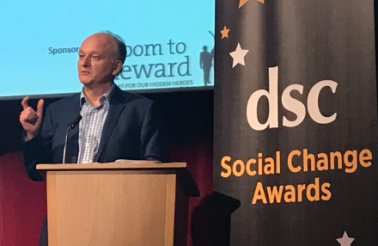The charity sector needs to “return the values that differentiate” it from the public and private sectors, Paul Streets, chief executive if the Lloyds Bank Foundation for England and Wales, said last night.
Streets was giving the Directory of Social Change’s annual lecture last night, and said that larger charities needed to stop squeezing out smaller ones if they want the public to trust them.
“If the last couple of years has taught us anything at all as a sector it is that we need to return to the values and ethos that differentiate us from the public and private sectors,” he said. “That means not aping their top down market driven approaches.”
He added that: “The greatest anguish for many small charities we support comes when they’re on the sharp end of competitive practices from large charities.”
Streets called for better relationships between small and larger charities.
He said: “If we in this voluntary sector don’t mirror in our own relationships the value we place on relationships with those we serve, frankly we’ve only got ourselves to blame if a commissioner decides they’d prefer to go to a private provider rather than us, or the public are ever more sceptical about the requests for their money.”
'Social change comes from the bottom up'
Streets said the sector needs to “reconnect with our campaigning routes”.
“Politics and power may matter but real social change is bottom up and it happens to real people,” he said.
He said that it is the way charities listen to people, before designing services, which makes the sector different from the state.
“They start with the person and build a relationship to establish trust only then do they layer on the service,” he said. And that by doing this they “put the person who comes through their door back in control”.
Streets called for commissioners to put more trust in charities.
“That doesn’t mean that you shouldn’t go through due diligence to ensure they’re sound organisations,” he said. But “having done that we should assume they know a hell of a lot better than us how to meet local need”.
Small charities more sustainable
He also said that small charities are actually more sustainable than larger ones.
“They’re here because they responded to a need they saw, not a contract they pitched for,” and this means they are “going to continue doing it any way even if they don’t get a grant or contract because they’re there because they believe they should be.
“Unlike the commercial provider or frankly a national charity who pull out if the contract is lost.”
Related articles











